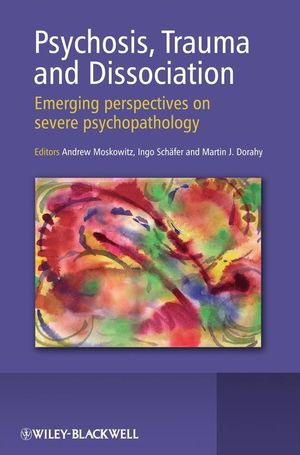Product desciption
Psychosis Trauma And Dissociation Emerging Perspectives On Severe Psychopathology Andrew Moskowitz by Andrew Moskowitz, Ingo Schäfer, Martin J. Dorahy 9780470511732, 9780470699652, 0470511737, 0470699655 instant download after payment.
In the 100 years since Eugen Bleuler unveiled his concept of schizophrenia, which had dissociation at its core, the essential connection between traumatic life events, dissociative processes and psychotic symptoms has been lost. Psychosis, Trauma and Dissociation is the first book to attempt to reforge this connection, by presenting challenging new findings linking these now disparate fields, and by comprehensively surveying, from a wide range of perspectives, the complex relationship between dissociation and psychosis. A cutting-edge sourcebook, Psychosis, Trauma and Dissociation brings together highly-respected professionals working in the psychosis field with renowned clinicians and researchers from the fields of traumatic stress, dissociation and the dissociative disorders, and will be of interest to those working with or studying psychotic or dissociative disorders, as well as trauma-related conditions such as borderline personality disorder or complex post-traumatic stress disorder. It makes an invaluable contribution to the burgeoning literature on severe mental disorders and serious life events. The book has three sections: Connecting trauma and dissociation to psychosis - an exploration of the links between trauma, dissociation and psychosis from a wide range of historical and theoretical perspectives. Comparing psychotic and dissociative disorders - a presentation of empirical and clinical perspectives on similarities and differences between the two sets of disorders. Assessing and treating hybrid and boundary conditions - consideration of existing and novel diagnostic categories, such as borderline personality disorder and dissociative psychosis, that blend or border dissociative and psychotic disorders, along with treatment perspectives emphasising humanistic and existential concerns. Content: Chapter 1 Historical Conceptions of Dissociation and Psychosis: Nineteenth and Early Twentieth Century Perspectives on Severe Psychopathology (pages 7–20): Warwick Middleton, Martin J. Dorahy and Andrew MoskowitzChapter 2 Hysterical Psychosis: A Historical Review and Empirical Evaluation (pages 21–33): Eliezer Witztum and Onno van der HartChapter 3 Association and Dissociation in the Historical Concept of Schizophrenia (pages 35–49): Andrew MoskowitzChapter 4 Ego?Fragmentation in Schizophrenia: A Severe Dissociation of Self?Experience (pages 51–64): Christian ScharfetterChapter 5 Delusional Atmosphere, The Psychotic Prodrome and Decontextualized Memories (pages 65–78): Andrew Moskowitz, Lynn Nadel, Peter Watts and W. Jake JacobsChapter 6 The Complex Overlap between Dissociation and Schizotypy (pages 79–89): Timo Giesbrecht and Harald MerckelbachChapter 7 Pierre Janet on Hallucinations, Paranoia and Schizophrenia (pages 91–103): Andrew Moskowitz, Gerhard Heim, Isabelle Saillot and Vanessa BeavanChapter 8 From Hysteria to Chronic Relational Trauma Disorder: The History of Borderline Personality Disorder and its Links with Dissociation and Psychosis (pages 105–115): Elizabeth HowellChapter 9 An Attachment Perspective on Schizophrenia: The Role of Disorganized Attachment, Dissociation and Mentalization (pages 117–133): Giovanni Liotti and Andrew GumleyChapter 10 Childhood Trauma in Psychotic and Dissociative Disorders (pages 135–150): Ingo Schafer, Colin A. Ross and John ReadChapter 11 Dissociative Symptoms in Schizophrenia (pages 151–163): Ingo Schafer, Volkmar Aderhold, Harald J. Freyberger and Carsten SpitzerChapter 12 Psychotic Symptoms in Complex Dissociative Disorders (pages 165–175): Vedat Sar and Erdinc OzturkChapter 13 Advances in Assessment: The Differential Diagnosis of Dissociative Identity Disorder and Schizophrenia (pages 177–189): Marlene Steinberg and Harold D. SiegelChapter 14 Cognitive Perspectives on Dissociation and Psychosis: Differences in the Processing of Threat? (pages 191–207): Martin J. Dorahy and Melissa J. GreenChapter 15 Depersonalization Disorder and Schizotypal Personality Disorder (pages 209–220): Daphne Simeon and Holly K. HamiltonChapter 16 Contributions of Traumatic Stress Studies to the Neurobiology of Dissociation and Dissociative Disorders: Implications for Schizophrenia (pages 221–238): Eric Vermetten, Ruth Lanius and J. Douglas BremnerChapter 17 Treating Dissociative and Psychotic Disorders Psychodynamically (pages 239–253): Valerie Sinason and Ann?Louise S. SilverChapter 18 Dissociative Psychosis: Clinical and Theoretical Aspects (pages 255–269): Onno van der Hart and Eliezer WitztumChapter 19 Trauma?Based Dissociative Hallucinosis: Diagnosis and Treatment (pages 271–280): Barry Nurcombe, James G. Scott and Mary E. JessopChapter 20 Dissociative Schizophrenia (pages 281–294): Colin A. RossChapter 21 The Role of Double Binds, Reality?Testing and Chronic Relational Trauma in the Genesis and Treatment of Borderline Personality Disorder (pages 295–306): Ruth A. BlizardChapter 22 Pharmacotherapy in the Collaborative Treatment of Trauma?Induced Dissociation and Psychosis (pages 307–318): Thomas Rudegeair and Susie FarrellyChapter 23 Accepting and Working with Voices: The Maastricht Approach (pages 319–332): Dirk Corstens, Sandra Escher and Marius RommeChapter 24 Dissociation, Psychosis and Spirituality: Whose Voices are we Hearing? (pages 333–345): Patte Randal, Jim Geekie, Ingo Lambrecht and Melissa Taitimu


